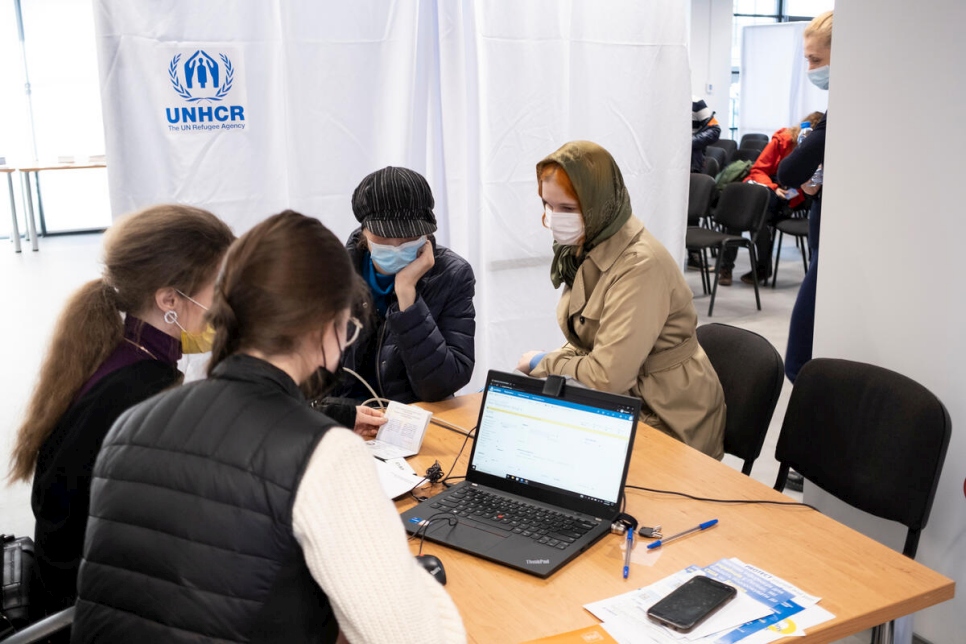This is a summary of what was said by UNHCR spokesperson Matthew Saltmarsh – to whom quoted text may be attributed – at today’s press briefing at the Palais des Nations in Geneva.
 UNHCR, together with partners and in close cooperation with the authorities, launched a cash assistance programme in Warsaw to help refugees from Ukraine meet their basic needs until they receive support from the state. Worth more than US $190 million, it will be rolled out in other cities in Poland. © UNHCR/Maciej Moskwa
UNHCR, together with partners and in close cooperation with the authorities, launched a cash assistance programme in Warsaw to help refugees from Ukraine meet their basic needs until they receive support from the state. Worth more than US $190 million, it will be rolled out in other cities in Poland. © UNHCR/Maciej Moskwa
The war in Ukraine has triggered one of the fastest-growing displacement and humanitarian crises ever. Within six weeks, more than 4.2 million refugees have fled the country, while a further 7.1 million are displaced internally.
As people continue to flee, UNHCR is working closely with local authorities in Ukraine to increase reception capacity. More core relief items are being distributed to reception and collective centres set up by the local authorities to expand their capacity to receive more IDPs. Our team is also working with the authorities in various locations to identify buildings needing refurbishment to serve as reception or collective centres.
Delivering aid remains challenging in the parts of the country where there is active fighting. We continue striving to reach hard-hit areas such as Mariupol and Kherson with life-saving assistance as part of inter-agency humanitarian convoys and have contributed to four such convoys under the humanitarian notification system: two to Sumy, one to Kharkiv and one to Sieverodonetsk, and delivered several additional convoys with the help of partners, reaching 15,600 people with relief items.
The latest such convoy was on 6 April, where UNHCR was among those carrying aid to Sievierodonetsk in Luhansk, eastern Ukraine. For weeks, people there have endured relentless shelling and shortages of basics like water, gas and electricity. Our team was able to deliver solar lamps, blankets, hygiene kits, baby formula and tarpaulin sheets to 3,000 people.
UNHCR with NGO partners continues providing protection services and referrals to authorities at border points and reception centres. Some 36,000 people have received such assistance and information at border points, transit, and reception centres and through hotlines. These services include legal assistance and psychosocial support among other things. UNHCR also provides protection services closer to conflict hotspots, at first points of arrival. UNHCR’s partners are still present with a significant protection capacity in Donetsk and Luhansk, while in other areas directly exposed to hostilities, connections with communities established before the war have been reinforced, particularly in the Zaporizhzhia, ensuring the distribution of aid.
UNHCR is also continuing to send humanitarian supplies into Ukraine from Poland. To date, 96 UNHCR aid trucks have been sent from our warehouse in Rzeszow, to help displaced and conflict affected people inside Ukraine. Supplies include blankets, hygiene kits, tarpaulins; solar lamps; shelter kits, sleeping bags; bedding, jerry cans; kitchen sets; winter clothing and Rubb halls.
Poland remains the main country of arrival for refugees, having welcomed more than 2.5 million since the start of the war. While the pace of arrivals is slowing, overall flows continue given the ongoing hostilities. UNHCR staff have observed that newly arrived refugees are coming from various parts of the country, including the east, with some reporting having spent weeks hunkering down at home or in shelters in dire conditions.
The priority needs identified by UNHCR for refugees receiving counselling at the UNHCR-UNICEF Blue Dot protection hub in Warsaw include mental health and medical services, financial assistance, child protection and social services, accommodation and access to employment.
In Poland, Ukrainian refugees have access to a Polish state ID number (PESEL). Over 700,000 Ukrainian refugees have registered with the authorities, allowing them access to health and other social support from the state; 94 per cent of those registered are women and children.
To enable refugees to prioritize and to complement the national authority-led response in Poland, UNHCR is expanding cash assistance. More than 10,000 people have registered in Warsaw over the past fortnight. UNHCR opened a second centre in Krakow this week. Additional enrolment sites are opening soon in partnership with the state and national NGOs.
On 1 March, UNHCR launched the initial Regional Refugee Response Plan (RRP), calling for $550.6 million. Since then, under UNHCR coordination, inter-agency teams have been working on developing a fuller RRP reflecting current needs, and that will be detailed later in April. The revised RRP will cover 10 months (March – December 2022) and is expected to bring together 110 partners including over 50 local NGOs, faith-based organizations and academia.







